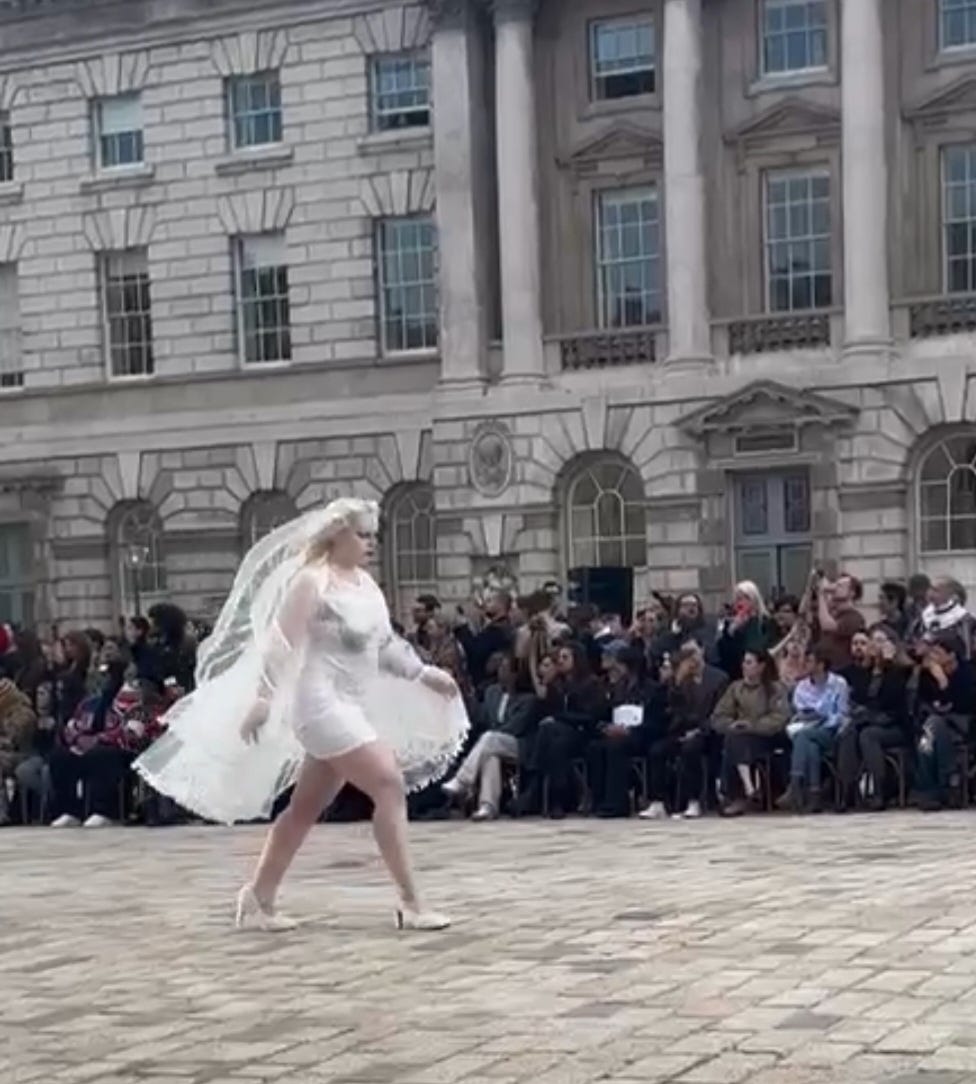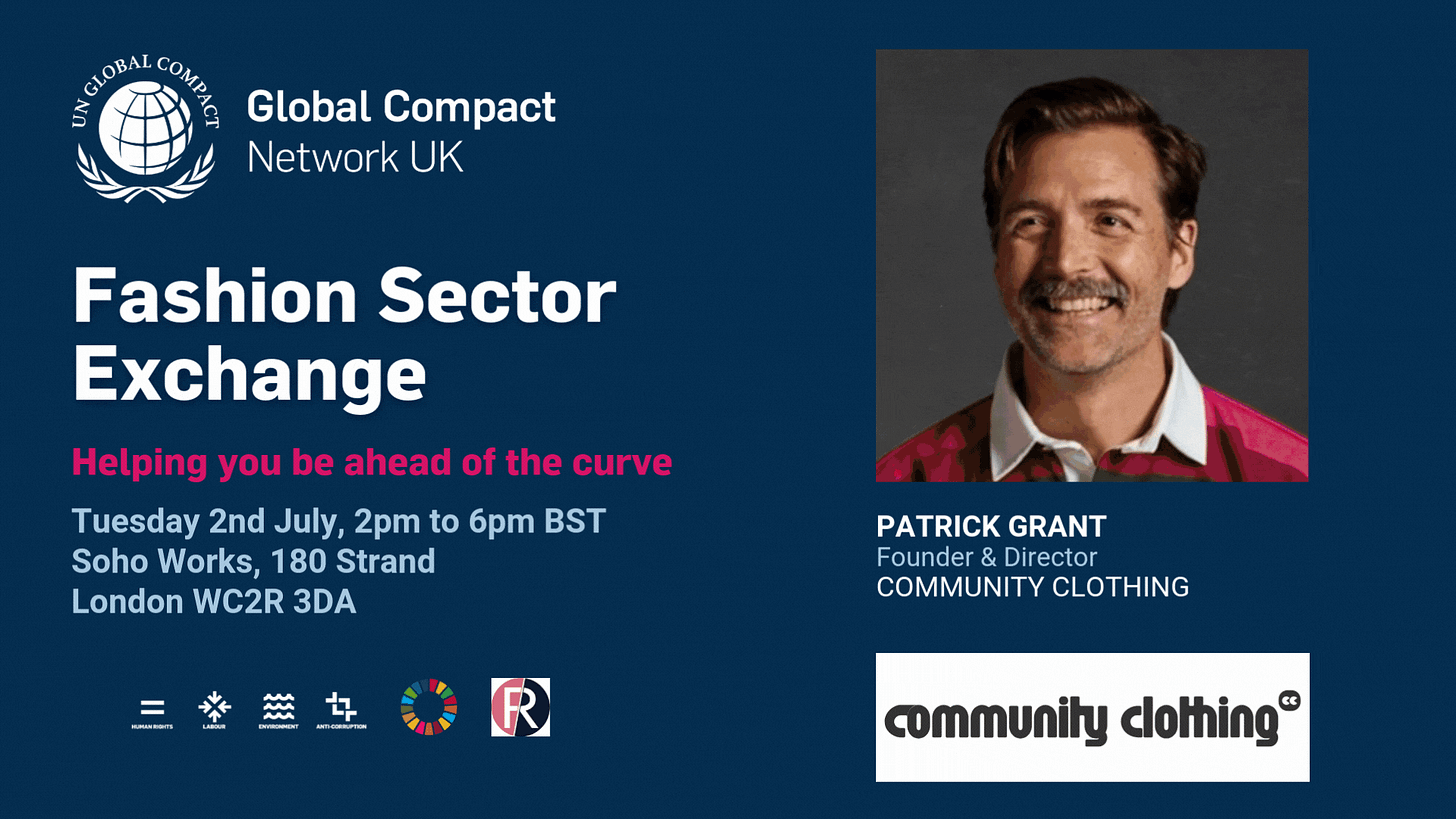Urgent Call to Address Brexit's Impact on the UK Fashion Industry
Also this week: Charles Jeffrey is a stand out at London Fashion Week & Tamara Cincik joins SHOWStudio's 'Is Fashion Week Broken?' Live Panel

UK Clothing Sales to EU Plummet Due to Brexit Red Tape
The Guardian published on 5th June, that UK exports of clothing and footwear to the EU have dived from £7.4bn in 2019 to £2.7bn in 2023. This alarming drop has fueled an 18% decrease in non-food goods exports to the EU, primarily due to the complex regulations and red tape introduced post-Brexit. Small and medium-sized enterprises (SMEs) are disproportionately affected, facing a larger relative burden compared to multinational firms.
Despite the booming European e-commerce market, UK brands have been unable to capitalize on this growth due to Brexit-related trade frictions. Many UK firms have had to reorganize their supply chains by setting up offices within the EU to bypass border regulations. This strategic shift, however, has come at a significant cost to UK jobs and skills. For example, a Leicester-based sock-maker moved production to Italy, ending over 100 years of manufacturing in the Midlands.
At Fashion Roundtable, we anticipated these challenges and have been at the forefront of addressing them. Our Brexit Follow-Up Report and continuous advocacy have underscored the urgent need for targeted policy changes to mitigate these detrimental impacts.
Fashion Roundtable: Leading the Charge
Key Proposals from Fashion Roundtable:
Reinstatement of the VAT Retail Export Scheme: Boost the economy by an estimated £10bn annually and restore UK brands' competitive edge in the EU market.
Simplification of Visa Requirements for Fashion Creatives: Ensure the free movement of talent to maintain the UK's status as a global fashion hub.
Addressing Rules of Origin Issues: Provide clear guidelines and support to ensure UK products qualify for tariff-free access.
Support for On-Shoring and British Manufacturing: Implement tax incentives and add garment workers to the Shortage Occupation List to bolster domestic production and preserve UK skills.
Easing Trade Frictions: Subsidize or eliminate ATA Carnets for traveling creatives to reduce costs and bureaucratic hurdles.
What We Need to See in Manifestos
As we approach the general election, it is imperative that UK political parties prioritize these recommendations in their manifestos. The future of the UK fashion industry is at stake, and bold, strategic policies are essential to navigate the post-Brexit landscape effectively.
Our Call to Action:
Reinstate the VAT Retail Export Scheme and provide clear trade guidelines to boost economic growth.
Simplify visa processes to attract and retain international talent.
Implement robust support for on-shoring and domestic manufacturing to safeguard UK jobs.
Ensure ethical work conditions and establish a Garment Fair Purchasing regulator to protect workers' rights.
Incorporate comprehensive intellectual property protections in all trade deals to secure the industry's future.
Fashion Roundtable remains unwavering in our commitment to advocating for these critical changes. The time for action is now. We must work together to create an industry that not only leads in creativity but also sets the standard for ethical and environmental responsibility.
Let's not let Brexit derail the progress of our fashion industry. We need decisive, forward-thinking policies that will secure a sustainable, inclusive, and resilient future for UK fashion. Join us in this urgent call to action and make your voice heard
Charles Jeffrey: The Highlight of London Fashion Week
Charles Jeffrey has once again proven why he is one of the most exciting and innovative designers in the fashion industry today. His recent presentation at the June London Fashion Week was not only a highlight of the event but also a testament to his boundless creativity and deep understanding of British iconography. The show, held at the iconic Somerset House, was a spectacle that will be remembered for years to come.
A British Icon in the Making
Often compared to legendary designers like Vivienne Westwood, Charles Jeffrey is carving out his own unique space in the fashion world. His ability to blend punk-inspired elements with traditional British motifs is nothing short of genius. Somerset House, once the regular venue for London Fashion Week, served as the perfect backdrop for Jeffrey's theatrical display. The grandeur of the location, combined with Jeffrey's innovative designs, created an atmosphere that was both nostalgic and forward-thinking.
A Diverse and Inclusive Cast
One of the most striking aspects of Jeffrey's show was the diversity of his cast. Models of all sizes, shapes, and genders took to the runway, embodying the inclusivity that is at the heart of the Loverboy brand. This commitment to representation is a breath of fresh air in an industry that often struggles with issues of diversity. Jeffrey's show was a celebration of individuality and self-expression, themes that are central to his work.
A Musical Extravaganza
The show was not just a visual feast but also a musical one. A choir sang from the balconies of Somerset House, filling the air with hauntingly beautiful melodies. The performance added a layer of drama and emotion to the event, enhancing the overall experience. The sight of the choir, dressed in traditional Beefeater costumes, juxtaposed with Jeffrey's avant-garde designs, was a powerful reminder of the rich cultural heritage that inspires his work.
Ahead of the Curve
At Fashion Roundtable, we have long been supporters of Charles Jeffrey and his visionary approach to fashion. His work embodies the very essence of what it means to be innovative in the face of adversity. As we have highlighted in our reports, the impact of Brexit on the UK fashion industry has been profound, and designers like Jeffrey are leading the charge in navigating these challenging times. His ability to adapt and thrive amidst the post-Brexit landscape is a testament to his resilience and creativity.
A Bright Future
Charles Jeffrey's show at London Fashion Week was more than just a presentation; it was a statement. It highlighted the potential of the UK fashion industry and the incredible talent that exists within it. Jeffrey's journey from a queer club night in East London to one of the most anticipated shows at Fashion Week is a story of perseverance, creativity, and sheer determination.
We at Fashion Roundtable wish Charles Jeffrey all the best in his future endeavors. His vision and talent are exactly what the fashion industry needs to navigate the complexities of the post-Brexit era. We are confident that with the right support and policies in place, he will continue to achieve great things and inspire future generations of designers

Is Fashion Week Broken? The Future of The System | Our CEO Tamara Cincik joins SHOWStudio’s Live Panel Discussion
With the retail landscape more tumultuous than ever, our panel of industry insiders discuss the challenges today's designers face and how to combat them.
Joining SHOWstudio editor Hetty Mahlich is stylist Karen Binns, creative consultant John Mooney, entrepreneur Bisoye Babalola, CEO of Fashion Roundtable Tamara Cincik, and stylist Michael Miller, who break down the downfall of Matches Fashion and the ripple effect it has had on the industry.
Analyzing the Impact of EU Elections and Macron's Snap Election on the Fashion Industry
The recent EU elections and President Emmanuel Macron's call for a snap parliamentary election have sent shockwaves through European markets, creating a complex landscape for various industries, including fashion. Here’s a detailed analysis of how these political shifts might impact the fashion industry, particularly given France's pivotal role as a global fashion hub:
Market Instability and Consumer Confidence
The political turmoil in France, particularly with the far-right National Rally's significant gains, has led to considerable market instability. French and European markets experienced a sell-off, with the Paris stock exchange losing over €60bn in value. This volatility undermines consumer confidence, a critical factor for the fashion industry, which relies on discretionary spending. When markets are unstable, consumers tend to be more conservative with their spending, impacting sales of non-essential items like fashion.
Impact on Trade and Supply Chains
Macron's decision to call a snap election in response to the far-right victory adds another layer of uncertainty to the trade landscape, already complicated by Brexit. The reaction in French and European markets, with a sell-off in stocks and bonds, highlights concerns over future trade policies. For the fashion industry, which depends heavily on international supply chains, this uncertainty could lead to increased costs and disruptions. Brands might face higher tariffs, more stringent customs regulations, and potential delays, all of which can affect their operations and profitability.
Currency Fluctuations
The euro's decline against the US dollar amidst political instability means that European fashion brands may encounter higher costs for importing materials priced in dollars. This scenario can lead to increased consumer prices or reduced profit margins for brands. Conversely, a weaker euro might make European fashion exports cheaper and more competitive in non-EU markets, potentially boosting sales abroad. However, the net effect will depend on the balance between increased import costs and the benefits of more competitive export pricing.
France as a Global Fashion Hub
France's role as a global fashion hub means that any instability within the country has far-reaching implications for the fashion industry worldwide. Paris, the epicenter of global fashion, hosts some of the industry's most important events, including Paris Fashion Week. The uncertainty and potential policy shifts resulting from Macron's snap election could affect the planning and execution of these events, impacting designers, buyers, and the entire fashion ecosystem.
Additionally, French fashion houses like Chanel, Louis Vuitton, and Dior are global powerhouses. Instability in France can disrupt their operations, influencing global supply chains and retail markets. For instance, if political turmoil leads to strikes or other disruptions, it can delay production schedules and affect the timely delivery of collections.
Impact on Major Fashion Stocks
The instability has also impacted major fashion stocks, such as LVMH (Moët Hennessy Louis Vuitton), Kering, and Hermès. These luxury conglomerates are heavily exposed to market fluctuations due to their significant presence in global markets.
LVMH: As the world's largest luxury goods company, LVMH's stock is sensitive to market conditions and consumer confidence. The recent market sell-off led to a notable drop in LVMH's share price. Investors are concerned about the impact of political instability on consumer spending, particularly in Europe, which is a key market for LVMH. Additionally, higher borrowing costs in France could affect the company's financing costs, potentially impacting its investment strategies.
Kering: Another major player in the luxury fashion sector, Kering, which owns brands like Gucci and Saint Laurent, has also seen its stock affected. Market instability can lead to reduced consumer spending on high-end goods, impacting Kering's revenue. Moreover, potential changes in trade policies and tariffs could increase costs for importing raw materials and exporting finished products, affecting the company's profitability.
Hermès: Known for its exclusivity and high-quality craftsmanship, Hermès could face similar challenges. The company might experience increased costs due to currency fluctuations and higher import prices for raw materials. Additionally, any disruptions in the supply chain caused by political instability could delay product deliveries, impacting sales and revenue.
Political Climate and Regulatory Changes
The rise of far-right parties across Europe, particularly in France, Germany, and Italy, suggests potential shifts in regulatory frameworks that could affect the fashion industry. These parties often advocate for stricter immigration controls, which could impact the availability of skilled labor in fashion production and design. Furthermore, changes in trade agreements or the implementation of protectionist policies could complicate cross-border trade, affecting everything from sourcing materials to selling finished products. The industry's adaptability to these changes will be crucial for maintaining operational efficiency and market competitiveness.
Impact on Sustainability Initiatives
The EU’s Green Deal, which has been a cornerstone of the European Commission’s agenda, faces new challenges with the increased influence of right-wing parties. The fashion industry, which has been aligning itself more with sustainability goals, might find these initiatives slowed or altered. This could impact funding and support for sustainable fashion practices, from eco-friendly materials to ethical production methods. Brands committed to sustainability may need to navigate a more complex regulatory environment to maintain their green credentials.
Strategic Responses for the Fashion Industry
Diversifying Supply Chains: Brands should consider diversifying their supply chains to reduce dependency on any single market, thereby mitigating risks associated with political instability. This might involve sourcing materials from multiple regions or establishing production facilities closer to key markets.
Local Manufacturing: Investing in local manufacturing can reduce supply chain disruptions and appeal to consumers increasingly interested in locally-produced and sustainable products. This strategy can also help preserve jobs and skills within Europe, countering the negative impact of political volatility.
Adapting to Market Demands: Understanding and adapting to changing consumer sentiments amidst political and economic uncertainties can help brands stay relevant. This includes emphasizing sustainability and ethical practices, which continue to resonate with a growing segment of consumers.
Engaging in Advocacy: The fashion industry can play a proactive role by engaging in advocacy for policies that support sustainable practices, fair trade, and ethical labor standards. This can help shape a favorable regulatory environment that supports the industry’s growth and sustainability goals.
Conclusion
The recent EU elections and Macron's snap election call present both challenges and opportunities for the fashion industry. While market instability and potential regulatory changes pose significant risks, there is also an opportunity for the industry to innovate and adapt. By focusing on sustainability, local manufacturing, and diversifying supply chains, the fashion sector can navigate these uncertain times and emerge stronger. The industry’s ability to respond strategically to these political shifts will be crucial in maintaining its growth and resilience.
Fashion Sector Exchange, UN Global Compact x Fashion Roundtable: Tuesday 2nd July 2024
10% of global CO₂ emissions are attributed to the fashion industry. In the UK alone, one million tonnes of textiles are disposed of every year. Garment workers across the world systemically earn below a living wage, and modern slavery is rife within supply chains. When it comes to sustainability, the fashion sector continues to lag. To catch up with other sectors, businesses need support to anticipate changing regulations and adapt effectively. Yet the ever-changing ESG landscape and new reporting requirements mean businesses lack the necessary time and funding to act.
The Fashion Sector Exchange is an opportunity to mobilise key stakeholders across the fashion industry for the Business Sector Exchanges. Attendees will join business, government, academia, and civil society representatives to gain a better understanding of current sustainability issues, hear best practices from businesses that are ahead of the curve, and inspire action through networking with peers.
Gain a better understanding of current sustainability issues, hear best practices from businesses that are ahead of the curve, and inspire action through networking with peers as we discuss:
Slow vs fast fashion
Disruption in supply chains
What’s next in sustainable fashion
Speakers include: Tamara Cincik (Founder & CEO of Fashion Roundtable), Baroness Lola Young of Hornsey OBE, Patrick Grant (Community Clothing), Rachel Arthur (UN Environment Programme), Megan Shearer (Monica Vinader Ltd), Bex Hall (Sedex) and more!
Deadline Extension: Free Business Support Programme from Fashion District x The Trampery
The deadline for Evo Fashion applications has been extended to midnight on Monday, 17th June!
Evo Fashion is a business programme aimed at helping tech start-ups improve their sustainability, increase team effectiveness, and accelerate growth. Delivered by Fashion District and Evo Learning, this 5-month business programme is free, funded by London & Partners as part of the Grow London Early Stage programme.
Evo Fashion is suitable for start-ups and early-stage businesses with science or technology-driven software, hardware or related solutions that could be applicable to the fashion and/or materials industries. To qualify, you must be a registered business based in London, employ at least 2 individuals, and have a trading history of at least 18 months.






